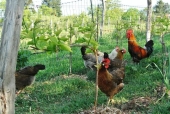I have a few questions about ducks, and after perusing the forums just can't quite find the solution I'm looking for. So here we go:
Climate:
Central Montana, zone 3b, first and lost frost dates around Sept 3 and June 6, respectively. Heavy annual snowfall of around 110". Montane, elevation about 3,800 feet. Hot, dry summers, low humidity. Acidic soil.
What we have:
3 adult Peking females
2 juvenile Magpies (unsexed)
1 juvenile Khaki (unsexed)
Enclosure:
We rent, so we don't like to free range (they've wandered into our neighbors' yard before). Right now we have them in "the duck paddock", with a kiddie pool for wading, a rubber bowl for drinking, and an enclosed shelter filled with hay. We'll be moving them into the garden in a couple of weeks to work the soil and eat the greens that are left over, and likely insulating our hoop coop to be their new, more portable house.
Feed:
We give an assortment - raw oats from a ranch up the road, meat bird pellets (chicken food), and raw wheat (again, local stuff), and the occassional greens or sunflower seed fodder. When the weather's nice, we free range the pekings, but the other 3 will just wander off. We need to get them in a paddock shift system, but with winter pretty much here already, it's time to just get them situated for the season.
Problem #1
The Pekings laid an egg a day apiece roughly when we first got them (a few months ago, they were already fully grown, age unknown). They went through a molt for about 6 weeks, no eggs, then started laying again. I'd guess they haven't laid in two months now. There was a heavy molt, but now that that appears to be over, still no eggs.
These ducks are funny and charismatic, but almost seem too big for their own good - they seem to have a hard time walking sometimes, and they remind me of a cornish cross that's allowed to live past the 8 week mark, just too big to really function. But I can't decide if that's really a part of the problem, or some other underlying issue.
I don't want to have to butcher, but these girls go through a TON of feed in a day, and living in 3b, there are only so many things I can do here to grow food for them. We rent on a limited parcel of land, so options are tricky.
Problem #2
Winter water - how do you do it without winding up with an ice rink in your yard from dumping it? The ground here stays frozen at least 4 months out of the year. I get that I could provide them with a large heated dog bowl (we have electrical access at least), but I have a feeling this is going to get messy fast.
Problem #3
Feed costs - I feel like our feed is not ideal right now, but I'm hard pressed to diversify it any more than we already have. We have a grow area setup upstairs, so I'm going to try to get some greens going to put in planters in the windows of our interior, but that's about it. Fodder system will continue, but worm bins, as many have suggested, won't really be possible unless we do it in the greenhouse, which will definitely freeze without an auxiliary heat source or
compost pile, which we don't really have because we feed everything to our chickens.
So now I'm wondering if ducks are even really practical in this climate? In keeping with the ideas of permaculture, and working within nature's natural rules, am I just trying to make something work that maybe isn't designed to work in this climate? I suppose the local waterfowl fly south for good reason







 1
1
















 . And, since they are such a large breed, they're going to need a lot of feed to make those eggs, especially as it gets colder and they need more to keep warm. So, the problem may not be so much the fact that you have ducks, but rather the fact that you have pekin ducks.
. And, since they are such a large breed, they're going to need a lot of feed to make those eggs, especially as it gets colder and they need more to keep warm. So, the problem may not be so much the fact that you have ducks, but rather the fact that you have pekin ducks.




. And, since they are such a large breed, they're going to need a lot of feed to make those eggs, especially as it gets colder and they need more to keep warm. So, the problem may not be so much the fact that you have ducks, but rather the fact that you have pekin ducks.




 3
3








